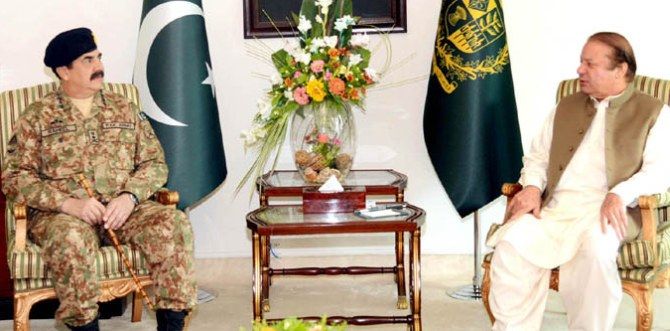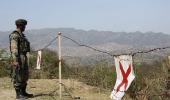
'In order to achieve Pakistan's psychological isolation and pariah status, breaking all cultural, economic and people to people contacts must become a government policy with clear linkage to a change in behaviour by the Pakistani regime,' says Colonel Anil A Athale (retd).
In August 2008 as I landed at Pretoria airport, the immigration officer asked the purpose of my visit. When I told I had come to study the history and process that led to the end of the apartheid regime in South Africa, his spontaneous reaction was that is old hat and why now so late in the day?
As India grapples with methods to neutralise the terror from its neighbour, the South African experience offers an interesting model to apply with modifications.
The African National Congress-led struggle against apartheid in South Africa had 'regime change' as its aim.
There are striking parallels between Pakistan and the erstwhile racist South Africa. Pakistan likewise discriminates against its citizens on the basis of religion and oppresses its population. It is true that at the social level such discrimination exists even in India or the US for that matter.
But what distinguishes Pakistan is that its discrimination against the Ahmediyyas, Christians, Hindus and Shias is part of its legal State framework.
Pakistan, like apartheid South Africa, is a pariah State.
Of all the insurgencies, the South African one had the greatest degree of legitimacy. Increasingly, even the Afrikaners saw apartheid as absurd. During the 1980s, South African whites increasingly became international pariahs. Almost a reverse apartheid began to take shape.
South African academic Pierre du Toit wrote in his book South Africa's Brittle Peace: 'The country was barred from the Olympic Games, the United Nations and ousted from many other venues of international recognition and prestige. The psychological deprivation provided a powerful stimulus towards negotiating a new political order.'
There is a myth that sports and culture are immune to politics and should be kept separate.
In the early 1970s, spearheaded by the newly independent African nations, there was a worldwide sports boycott of South African whites. The International Olympic Committee withdrew its invitation to South Africa to the 1964 Summer Olympics when then interior minister Jan de Klerk insisted the team would not be racially integrated.
In 1968, the IOC was prepared to re-admit South Africa after assurances that its team would be multi-racial, but a threatened boycott by African nations and others stalled this.
The IOC adopted a declaration against apartheid in sport on June 21, 1988. South Africa was formally expelled from the IOC in 1970.
To a sports-loving nation, the sports boycott was particularly hurtful and many talented sportspersons emigrated to Britain or Australia to escape it.
Wide-ranging discussions during my visit confirmed the perception that South Africa's isolation in sport hurt the racist regime badly.
Right until the end, when the apartheid regime gave into the ANC and ushered in a multi-racial nation, militarily the regime remained undefeated. Throughout most of the struggle, the ANC was extremely weak. South Africa had a ring of buffer States around it and insulated the mainland from any direct military threat.
In an interview with M Mabhongo, chief director, UN, foreign ministry, Pretoria, on August 4, 2008, he mentioned that the 1985 flight of American capital led to a change of guard in the ruling National Party and moderate elements came to power.
The aim of the ANC's military actions was to make South Africa ungovernable and not achieve a military victory. Mabhongo felt the end of the regime came due to the lowering of morale of the security forces, South Africa's international pariah status and the loss of neignbouring Angola to rebel forces.
The inevitable conclusion is that international events and pressure were decisive factors in the victory of the ANC-led struggle.
At one level, it is true it will be difficult for India to get the kind of world consensus against Pakistan that the ANC could get. But at the same time today, with every terror attack linked to Pakistan, the citizens of that country already face problems in getting a visa. Even China and Saudi Arabia, two of Pakistan's staunchest friends, are reluctant to grant visas to young Pakistanis.
In order to achieve Pakistan's psychological isolation and pariah status, breaking all cultural, economic and people to people contacts must become a government policy with clear linkage to a change in behaviour by the Pakistani regime.
The only exception to this should be family visits with clearly devolved responsibility on the host family for the visitors' good behaviour.
Before the fall of the Berlin Wall and East Germany's demise, then German chancellor Helmut Kohl remarked that a time comes when 'engagement,' instead of modifying the target country's behaviour, ends becoming an endorsement and encouragement to its deviant behaviour.
This stage has come in respect of our approach to Pakistan. It is time to try the isolation strategy.
This is nothing new and China has been practicing it vis-a-vis Taiwan for several years. Under Chinese pressure, countries like India have also not established full diplomatic relations with Taiwan. The Arab League boycotted Israel for several years.
None of these efforts had universal support, but they did have the effect of isolating the target country and make it pay an economic price.
A few days ago, a television channel held a discussion on measures we could take to deal with Pakistani terrorism. The discussants dismissed the military option as too dangerous and other options as ineffective or counter-productive. The consensus seemed to be 'do nothing,' like in the case of the 26/11 attacks on Mumbai.
This is a dangerous recipe as it will mean a status quo and more such attacks. We have tried engagement for three decades or more, it is time we give isolation and a containment strategy a chance.
Colonel Anil A Athale (retd) has studied insurgencies in Kashmir, the northeast, South Africa, Northern Ireland, Sri Lanka and Chhattisgarh.
IMAGE: Pakistan Prime Minister Nawaz Sharif, right, with army General General Raheel Sharif.











 © 2025
© 2025